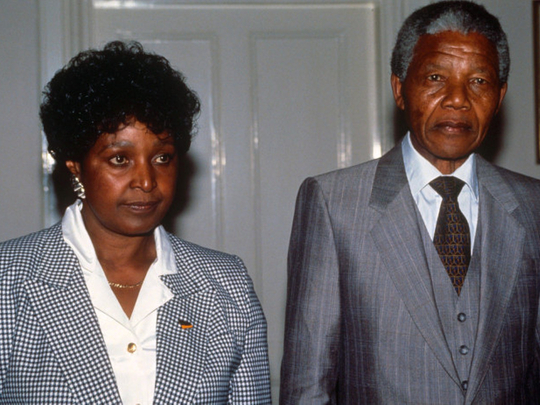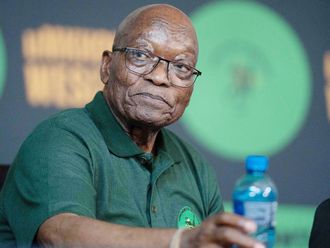
JOHANNESBURG: South Africa's Winnie Madikizela-Mandela, an anti-apartheid stalwart and wife to Nelson Mandela when he was imprisoned on Robben Island, died on Monday, her personal assistant Zodwa Zwane said. She was 81.
#Breaking: South African anti- apartheid campaigner Winnie Madikizela-Mandela dies at the age of 81, her personal assistant has confirmed. pic.twitter.com/DKpFXOlLFp
— Gulf News (@gulf_news) April 2, 2018
Zwane gave no further details but said a statement would be released later.
Winnie Mandela: South Africa's flawed heroine
Winnie Madikizela-Mandela's marriage to Nelson Mandela and her anti-apartheid activism ensured many South Africans saw her as "the mother of the nation", but her past was littered with dark controversies.
Born Nomzamo Winifred Zanyiwe Madikizela, and always known simply as "Winnie", she was married to Nelson for 38 years - one of the most storied romances of modern history.
Most of their marriage was spent apart, with Nelson imprisoned for 27 years, leaving her to raise their two daughters alone and to keep alive his political dream under the repressive white-minority regime.
In 1990 the world watched when Nelson Mandela finally walked out of prison - hand in hand with Winnie.
But they separated just two years later and divorced in 1996 after a legal wrangle that revealed her affair with a young bodyguard.
With or without Nelson, Winnie built her own role as a tough, glamourous and outspoken black activist with a loyal grassroots following in the segregated townships.
"From every situation I have found myself in, you can read the political heat in the country," she said in a biography.
Winnie was born September 26, 1936, in the village of Mbongweni in what is now Eastern Cape.
She completed university, a rarity for black women at the time, and became the first qualified social worker at Johannesburg's Baragwanath Hospital.
It was her political awakening, especially her research work in Alexandra township on infant mortality, which found 10 deaths in every 1,000 births.
"I started to realise the abject poverty under which most people were forced to live, the appalling conditions created by the inequalities of the system," she said.
Hounded by police
Nelson Mandela, who was then married to his first wife, met Winnie at a bus stop in Soweto when she was 22.
They wed in June 1958, but he soon went underground, pursued by the apartheid authorities.
In October that year, Winnie was arrested for the first time at a protest by women against the pass system that restricted movements of black people in white-designated areas.
After Nelson was sentenced to life in prison in 1964, Winnie was also in and out of jail as the police hounded her in a bid to demoralise him.
Banished, bombed
Government security forces tortured her, tried locking her up, confined her to Johannesburg's Soweto township, and then banished her to the desolate town of Brandfort, where her house was bombed twice.
She was allowed to visit her husband in prison rarely, and they were always divided by a glass screen.
Throughout the height of apartheid, Winnie remained at the forefront of the struggle, urging students in the Soweto uprising in 1976 to "fight to the bitter end".
But in the 1980s, the militant-martyr began to be seen as a liability for Mandela and the liberation movement.
She had surrounded herself with a band of vigilante bodyguards called the Mandela United Football Club, who earned a terrifying reputation for violence.
Winnie was widely linked to "necklacing", when suspected traitors were burnt alive by a petrol-soaked car tyre being put over their head and set alight.
Her notoriety was reinforced by a speech in 1986 when she declared that "with our boxes of matches and our necklaces we shall liberate this country."
'Something went horribly wrong'
In 1991, Winnie was convicted of kidnapping and assault over the killing of Stompie Moeketsi, a 14-year-old boy. Moeketsi, who was accused being an informer, was murdered by her bodyguards in 1989.
Her jail sentence was reduced to a fine, and she denied involvement in any murders when she appeared before Archbishop Desmond Tutu at the Truth and Reconciliation Commission hearings.
"She was a tremendous stalwart of our struggle, and icon of liberation - something went wrong, horribly, badly wrong," Tutu said as damning testimony implicated her.
She served as a deputy minister in President Mandela's government, but was sacked for insubordination and eased out of the top ranks of the ruling party.
After a 2003 conviction for fraud, she later rehabilitated her political career winning a seat in parliament in 2009 elections.
But her bitterness emerged in 2010 newspaper interview, saying: "Mandela let us down. He agreed to a bad deal for the blacks."
She also called Tutu a "cretin" and the reconciliation process a "charade", though she later claimed the quotes were never meant to be published
Despite it all, she was a regular visitor travelling from Soweto — where she still lived — to Mandela's bedside in his final months, and she said she was present when he died.
He did not leave her anything in his will.
At her lavish 80th birthday party in Cape Town, Madikizela-Mandela wore a sparkling white dress and beamed with pleasure as she was lauded by guests that included senior politicians from rival parties.
"Mama Winnie has lived a rich and eventful life, whose victories and setbacks have traced the progress of the struggle of our people for freedom," then vice president Cyril Ramaphosa, who is now president, told guests.
TIMELINE:
1936: Nomzamo Winifred Madikizela was born on September 26, 1936 in Bizana in the Eastern Cape. She later moved to Johannesburg to study social work after matriculating.
1957: She met lawyer and anti-apartheid activist Nelson Mandela and they were married a year later. They had two children together.
1963: Nelson Mandela was arrested and sentenced to life imprisonment for treason. Mandela was eventually released in 1990. During Nelson Mandela’s time in prison‚ Madikizela-Mandela was not spared the reach of the apartheid forces. She was placed under house arrest and at one time banished to Brandfort‚ a town in the Free State.
1969: Madikizela-Mandela became one of the first detainees under Section 6 of the notorious Terrorism Act of 1967.
She was detained for 18 months in solitary confinement in a condemned cell at Pretoria Central Prison before being charged under the Suppression of Communism Act of 1950.
1989: Madikizela-Mandela’s bodyguards had abducted Seipei‚ 14‚ in 1989‚ along with three other youths‚ from the home of Methodist minister Paul Verryn. Her six-year jail sentence was reduced to a fine and a two-year suspended sentence on appeal. Her marriage to Mandela began to flounder a few years after his release.
A letter she purportedly wrote to her young lover found its way into the newspapers. “You’re running around ****** at the slightest emotional excuse‚” she wrote. “The fact that I haven’t been speaking to Tata [Nelson Mandela] for five months now over you is no longer your concern. I keep telling you the situation is deteriorating at home. You are not bothered because you are satisfying yourself every night with a woman‚” Madikizela-Mandela reportedly wrote. In his book "Odyssey to Freedom"‚ veteran advocate George Bizos described how Mandela would not attend legal consultations Bizos had with Madikizela-Mandela during the Seipei trial.
“He drew the line at attending our consultations‚ primarily because these meetings were also attended by the young lawyer … her lover during the latter part of Nelson’s imprisonment and after he was released‚” Bizos wrote in his book.
1991: Madikizela-Mandela was convicted of kidnapping and being an accessory to assault of Stompie Seipei‚ a young activist who was killed by a member of her bodyguards‚ the Mandela United Football Club.
1994: The first democratic election was held, during which Madikizela-Mandela became an MP and was appointed deputy minister of arts and culture. She was fired by Mandela after an unauthorised trip to Ghana. She had been an MP ever since‚ despite limited appearances in Parliament in the past few years.
1996: The couple divorced‚ 37 years after their marriage.
2016: Madikizela-Mandela was conferred an Order of Luthuli in Silver during the National Orders Awards ceremony for her excellent contribution to the fight for the liberation of the people of South Africa.












